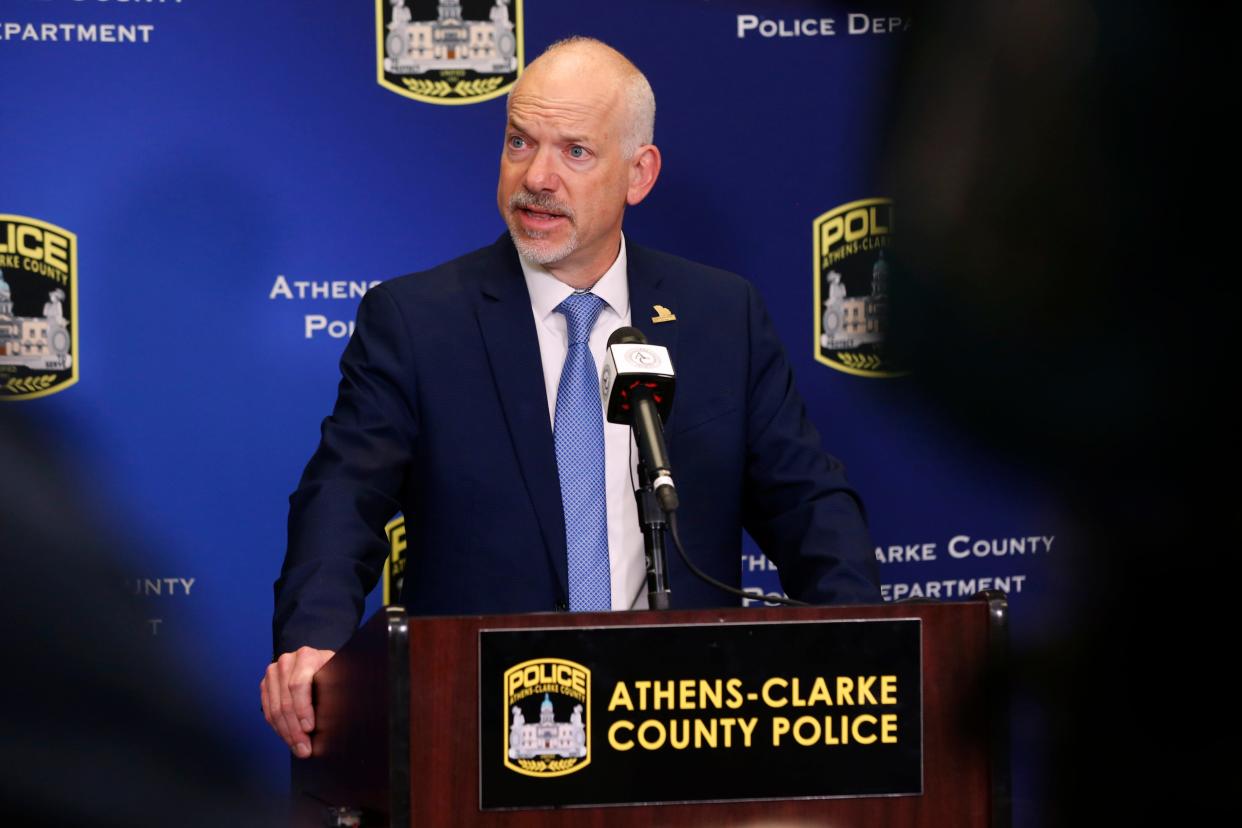What does it mean to be a 'sanctuary city'? Athens area officials offer differing views

Ongoing political fallout from last week’s slaying of 22-year-old Athens college student Laken Riley, allegedly at the hands of an undocumented immigrant charged with her murder, includes the lingering question of whether Athens-Clarke County is a “sanctuary city.”
At the root of that question, as Athens-Clarke County Mayor Kelly Girtz noted at a Wednesday news conference, is that there is no standard definition of “sanctuary city” in law or in practice. Yet in Athens-Clarke County, anger over Riley’s death has centered on what some people believe is a definitive statement that the community is, in fact, a sanctuary city, where undocumented immigrants have the supposed advantage of special consideration in which their immigration status is widely ignored.
Charged with murder and other offenses in the death of Riley -- a student on the Athens campus of the Augusta University College of Nursing who attended the University of Georgia last year -- is 26-year-old Jose Ibarra, a Venezuelan who unlawfully entered the country two years ago.
Seizing on what they believe is Athens-Clarke County’s status as a “sanctuary city” as a factor in Riley’s death, protestors filled a meeting room Wednesday morning at the Athens-Clarke County Police Department. They all but shouted Girtz down during the news conference he convened to talk about public safety initiatives in the wake of Riley’s death, along with the county’s “status related to immigration.”
Wednesday’s protesters, and others in the community, have focused on a 2019 resolution approved by Girtz and the county commission expressing support of undocumented, immigrant and Latino residents. In part, the resolution states the local government is “… welcoming to people from all lands and backgrounds and strives to foster a community where individuals of all statuses feel safe, are able to prosper, and can breathe free … .”
The resolution goes on to note that the county government “denounces white supremacy … and commits itself to working to reverse the damage that has resulted to Black, Brown, and all other minority communities.”
Athens-Clarke County Mayor Kelly Girtz holds press conference on community safety initiatives and ACC’s status related to immigration.
Posted by Athens Banner-Herald & OnlineAthens.com on Wednesday, February 28, 2024
Resolutions by the county government, however, do not carry the force of law, and are intended merely to express the sense of the mayor and commission on issues they may choose to address.
Defending the resolution at Wednesday’s news conference, Girtz said it should be viewed in conjunction with the time at which it was passed.
“You might remember the dynamic that we were living in in the late teens (the 2010s) in this country,” Girtz said, “where you had the president of the United States using the most vile terms about people who were foreign-born … .”
In 2018, for example, as large numbers of Central Americans surged toward the southern U.S. border, Trump threatened military action against them. “This is an invasion of our country, and our military is waiting for you!” Trump said via the Twitter (now X) social media platform to those surging toward the U.S. border with Mexico.
More: Athens mayor heckled by protesters while announcing new security measures for the city
More recently, as he campaigns for a second term as president, Trump has said people crossing the border illegally into the United States are “destroying the blood of our country.”
“The term ‘sanctuary city’ doesn’t have a sole legal or procedural definition,” Girtz said to a room jammed with local, state and national media and an estimated dozen protesters. “That term means different things to different people, depending on the context of the discussion.”
No sooner had Girtz got those words out than he was drowned out by shouts of “Liar!” and by one protester who told Girtz loudly, “You’re a liar and got blood on your hands! … You allowed this to happen!”

Girtz soldiered on to note that in his 18 years as an elected public official, his counterparts at the federal level in Congress have “failed to reach agreement on how to handle immigration.”
Most recently, a bipartisan proposal that would have limited entry at the U.S. border, raised standards for asylum claims, and increased the number of border protection personnel and immigration judges who hear asylum claims, failed to gain passage this month in Congress.
Nonetheless, Girtz took time Wednesday to note the bipartisan effort, and went on to say, “I urge Congress and the White House to act now and demonstrate a willingness to work on complementary legislation in the future.”
The mayor also invoked the spirit of compromise, saying, “My time in office has demonstrated that if your approach to legislation is all or nothing, you’re going to get nothing every single time.”
Turning his attention back to local concerns, the mayor told media and protesters Wednesday, “There’s been no legislation from this government that’s created sanctuary city status.”
In fact, Girtz said, state laws from 2008 and 2016 prohibit sanctuary policies and other sanctuary trappings in cities. Each year, in order to get state funds, the local government has to certify to the state that it isn’t running afoul of state sanctuary prohibitions, the mayor noted.
“We center our work here in Athens-Clarke County on humanity,” Girtz added. “Part of everybody’s humanity is the expectation of human dignity.”
To Girtz’s point that there is no specific definition of what constitutes a sanctuary city, even America’s Voice, an organization working for a “direct, fair, and inclusive road to citizenship for immigrants in the U.S. without papers,” notes that sanctuary status can mean limiting cooperation with immigration enforcement agencies to protect “low-priority immigrants,” while “still turning over those who have committed serious crimes.”
And even one of the community’s most vociferous recent critics on the issue of sanctuary, Republican U.S. Rep. Mike Collins, R-Jackson, whose district includes Athens-Clarke County, stops short of calling the community an outright “sanctuary city.”
In a letter posted Monday on X, which Collins is sending to Athens-Clarke County leaders, he concedes that “(w)hile Athens-Clarke County has not explicitly designated itself a sanctuary county by ordinance, it is a sanctuary county by word and deed.”
Collins also posted Tuesday on the X social media platform that when Ibarra -- who had made his way last year to New York City after illegally entering the United States in 2022 near El Paso, Texas -- left New York City, he did so knowing that “his next safe haven was Athens, GA.”
Ibarra apparently left New York after police there arrested him for allegedly endangering a child during a motor vehicle offense. According to media reports, Ibarra was released before federal Immigration and Customs Enforcement officers were able to ask that he be held in connection with his illegal entry into the United States.
Asked Tuesday how he knew that Ibarra knew he would have at least some measure of sanctuary protection in Athens-Clarke County, Collins said he had merely deduced that circumstance.
“I don’t talk to every tourist that vacations at the beach, but I deduce their search for saltwater and sunshine led them there,” Collins quipped in an email sent by one of his congressional staff members.
With or without a formal definition, the number of jurisdictions that employ sanctuary policies grew during Trump’s first term in office, according to the San Francisco-based Immigrant Legal Resource Center (ILRC), which trains attorneys and community advocates on immigration issues.
In a 2018 report, the ILRC indicated that, as of that date, more than 400 counties had put in place “stronger limitations on engaging in immigration enforcement … .”
It’s unclear whether Athens-Clarke County’s resolution is included in the ILRC count, but what is clear is that the community is part of an ongoing nationwide legal whack-a-mole exercise involving federal and state efforts to keep local governments from claiming sanctuary status, under the general meaning that it would involve not cooperating with federal immigration officials.
Among the most recent examples at the federal level is the No Funding for Sanctuary Cities Act, introduced in Congress last month by Rep. August Pfluger, R-Texas. Now in committee, the bill would hold back any Department of Justice or Department of Homeland Security grants from governments that block federal immigration enforcement.
"It is the height of hypocrisy that liberal mayors and governors who intentionally flout federal law by declaring themselves 'sanctuaries' from immigration laws are now begging the federal government for money to manage President Biden's border crisis," Pfluger said in announcing the proposal.
At the state level, Riley’s death has put some urgency behind legislative efforts to eliminate sanctuary cities. House Bill 1105, which would punish communities that didn’t get in touch with federal agencies when they detain anyone who has entered the country illegally, passed muster in a House committee and now goes on to the full House and then to the state Senate for a vote before potentially heading to the desk of Gov. Brian Kemp.
The intent of the legislation, which in part gives local law enforcement personnel the authority to arrest illegal aliens “when authorized by federal law,” and grants immunity from damages or liability in the “good faith” enforcement of federal immigration law, is to “require Georgia law enforcement officials to work in conjunction with federal immigration authorities and to utilize all resources made available by the federal government to assist state and local law enforcement officers in the enforcement of the immigration laws of this state and of the United States.”
The bill, actually introduced last year by Rep. Jesse Petrea, R-Savannah, could get a full House hearing as soon as Thursday.
This article originally appeared on Augusta Chronicle: Athens' status as a so-called sanctuary city is debated by officials

